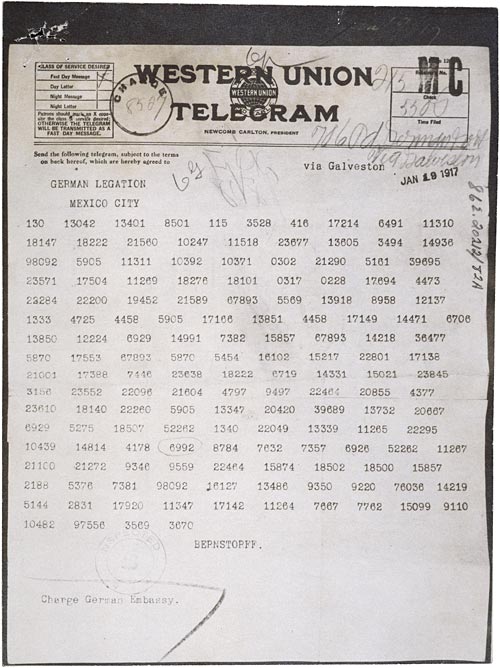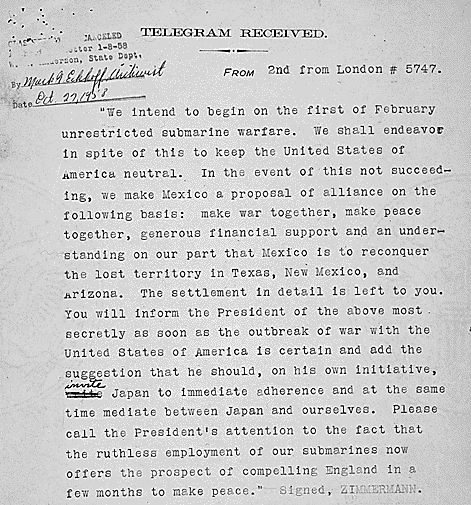Zimmerman Telegram: What Was The Zimmerman
Telegram, and How Did It Affect World War One?
The Zimmerman Telegram was an important piece of America's decision to enter World War One. After having remained neutral in the war for nearly three years, several events in 1916 and early 1917 occurred which brought America into the war against Germany.
Germany had previously engaged in unrestricted submarine warfare on the British, where the Germans declared they would sink any ship in or near British waters without warning. This included not just British and other allied shipping, but even ships from neutral nations, such as the United States. Several instances of German subs sinking neutral civilian ships and British civilian ships, such the William P. Frye, an American merchant ship in 1915, the British cruise ship Lusitania in 1915, and the French ship Sussex in early 1916.

Zimmerman Telegram-Coded Version
In May, 1916, Germany agreed to halt the practice of unrestricted submarine warfare (attacking ships without warning) in order to prevent possible American entry into the war. By early 1917, however, the British naval blockade of Germany (which the United States honored), was causing severe hardship to the German economy, prompting the Germans to renew their all-out naval attacks on the British, in an attempt to force Britain to sue for peace.
Still fearing the effect of antagonizing the Americans and their likely entry into the war on the side of Britain and France, Germany decided to make an offer to Mexico. This offer was sent to the German ambassador to Mexico by the German Foreign Minister, Arthur Zimmerman. In the so-called Zimmerman Telegram, Germany proposed an alliance between Germany and Mexico in the event of American entry into the war. Germany promised financial aid to Mexico and support in a Mexican war to re-conquer the territory lost in the first Mexican-American War. The telegram also asked Mexico to help negotiate peace between Germany and Japan in order to bring the Japanese also into the war against America and Britain.

Zimmerman Telegram-Decoded Version
The British intercepted the coded message and presented the decoded letter to American President Woodrow Wilson on February 24, 1917. The contents of the telegram were released to the American press on March 1, and the reaction among the American populace was predictable. Combined with the resumption of Germany's unrestricted submarine warfare on February 1, 1917, President Wilson asked Congress for a declaration of war on Germany on April 2, 1917. Congress voted for war, and the U.S. declared war on Germany on April 6, 1917, entering World War One.
Related to the contents of the Zimmerman Telegram are several questions:
Did the Germans admit that the Telegram was genuine? Or did they claim it was "fake news?"
On March 29, 1917, Zimmerman publicly admitted that he did indeed send the telegram to his ambassador in Mexico, defending his action as a logical precaution in the event of American entry into the war. Until his confirmation, many in the U.S. doubted the authenticity of the letter.
Did
Mexico consider declaring war on the United States based on the
Zimmerman Telegram?
The short answer is NO. Mexico was in the middle of one of the bloodiest civil wars in all of history at the time, and the government of President Carranza knew Mexico could not win against America, especially since Mexico had been unable to effectively prevent American occupation of the port city of Vera Cruz by the U.S. in 1914, and also had been unable to stop the American Army under General John Pershing from entering northern Mexico in 1916 in pursuit of Mexican rebel leader Pancho Villa.
Why was
Japan mentioned in the Zimmerman Telegram and what was the Japanese
reaction?
Japan had entered the war against Germany on Britain's side in 1914, primarily to gain control of German colonies among islands in the Pacific Ocean and on mainland China. The Zimmerman Telegram instructed the German minister in Mexico to ask the Mexican president to act as an intermediary between Germany and Japan to bring Japan into the theoretical war with the United States. Japan later released a statement that they were not interested.
Below
is the transcription of the infamous, and very ill-advised Zimmerman
Telegram:
(Decoded message text of the Zimmermann Telegram)
FROM 2nd from London # 5747.
"We intend to begin on the first of February unrestricted submarine warfare. We shall endeavor in spite of this to keep the United States of America neutral. In the event of this not succeeding, we make Mexico a proposal or alliance on the following basis: make war together, make peace together, generous financial support and an understanding on our part that Mexico is to reconquer the lost territory in Texas, New Mexico, and Arizona. The settlement in detail is left to you. You will inform the President of the above most secretly as soon as the outbreak of war with the United States of America is certain and add the suggestion that he should, on his own initiative, invite Japan to immediate adherence and at the same time mediate between Japan and ourselves. Please call the President's attention to the fact that the ruthless employment of our submarines now offers the prospect of compelling England in a few months to make peace." Signed, ZIMMERMANN
Resources
on the Zimmerman Telegram
Citation for Images: Zimmermann Telegram, 1917; Decimal File, 1910-1929, 862.20212/82A (1910-1929), and Decoded Zimmermann Telegram, 1917; Decimal File, 1910-1929, 862.20212/69, General Records of the Department of State; Record Group 59; National Archives
Page URL: http://www.ourdocuments.gov/doc.php?doc=60&page=transcript
The
Zimmerman Telegram, by Barbara
Tuchman
U.S.
Merchant Ships, Sailing Vessels, and Fishing Craft Lost from all
Causes during World War I
Primary
Documents - Arthur Zimmermann on the Zimmermann Telegram, 29
March 1917